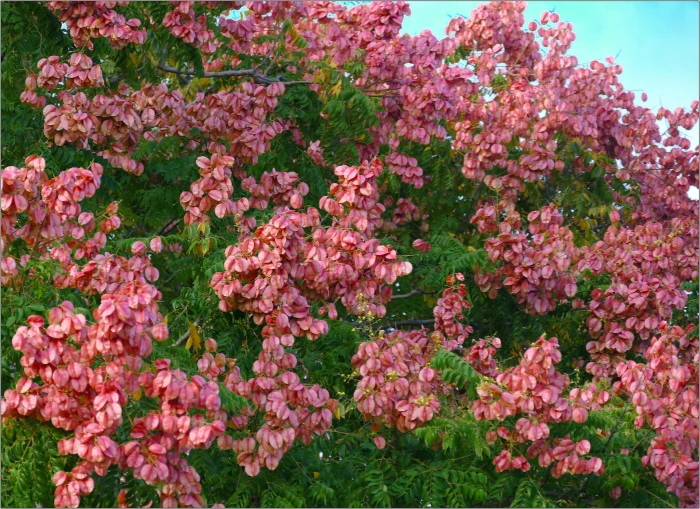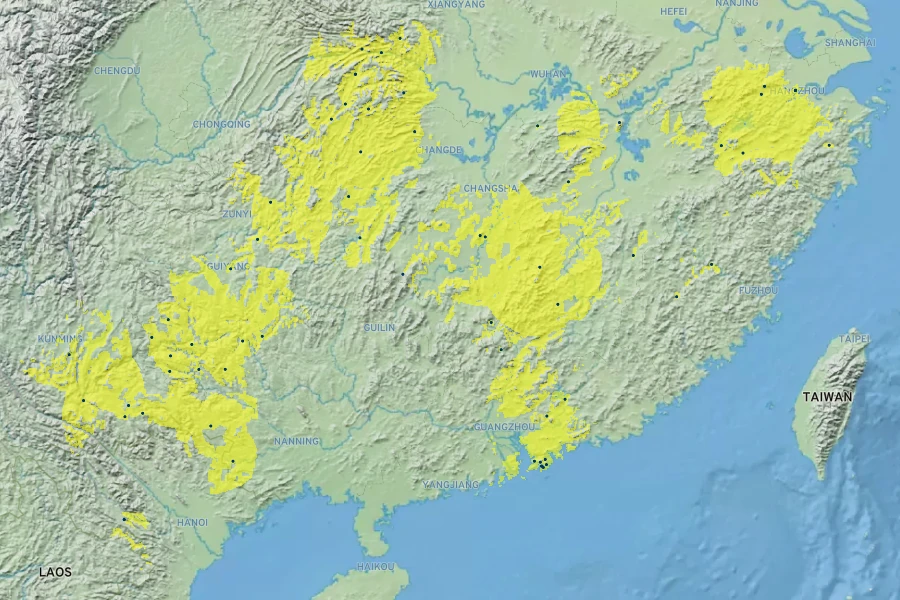Chinese Flame Tree
/
(Koelreuteria bipinnata)
Chinese Flame Tree (Koelreuteria bipinnata)
/

Surely Shirly
CC0 1.0 Universal
Image By:
Surely Shirly
Recorded By:
Copyright:
CC0 1.0 Universal
Copyright Notice:
Photo by: Surely Shirly | License Type: CC0 1.0 Universal | License URL: https://creativecommons.org/licenses/by/2.0/ | Uploader: Surely Shirly | Publisher: Flickr |

















































Summary
Koelreuteria bipinnata, commonly known as Chinese Flame Tree, is a small to medium-sized deciduous tree native to China and naturalized to Korea and Japan since at least the 1200’s. It typically grows to a height of 7–20 meters and is noted for its open, irregular form with a rounded crown. The tree is one of the few that blooms in the summer, with showy, fragrant yellow flowers tinged with red at the base. These flowers, with four petals each, are produced in large, branched panicles that can be 20–50 cm long. The flowering season extends from July to August, and in cooler climates such as middle Europe, it may occur in September. The tree can live for 50 to 150 years and is considered weak-wooded.
The Chinese Flame Tree is valued for its bright yellow flowers that provide a striking display in the summer, a season when few trees are in bloom. It is commonly used as a focal point in landscape design and is suitable for urban planting along streets, highways, parking lots, and in gardens as a shade or specimen tree. The tree adapts to a range of soil types, including clay, sand, and well-drained alkaline loam, and is drought-tolerant once established. It requires full sun and can withstand wind, air pollution, salt spray, and heat. CC BY-SA 4.0
The Chinese Flame Tree is valued for its bright yellow flowers that provide a striking display in the summer, a season when few trees are in bloom. It is commonly used as a focal point in landscape design and is suitable for urban planting along streets, highways, parking lots, and in gardens as a shade or specimen tree. The tree adapts to a range of soil types, including clay, sand, and well-drained alkaline loam, and is drought-tolerant once established. It requires full sun and can withstand wind, air pollution, salt spray, and heat. CC BY-SA 4.0
Plant Description
- Plant Type: Tree
- Height: 30-40 feet
- Width: 30-40 feet
- Growth Rate: Moderate
- Flower Color: Yellow
- Flowering Season: Summer
- Leaf Retention: Deciduous
Growth Requirements
- Sun: Full Sun
- Drainage: Medium
Common Uses
Bee Garden, Bird Garden, Butterfly Garden, Deer Resistant, Fire Resistant, Low Maintenance, Showy Flowers
Natural Habitat
East Asia, specifically China and Korea, with an open, irregular form and rounded crown, and showy, fragrant yellow flowers in summer
Other Names
Common Names: Chinese Flame Tree, Bougainvillea Golden-Rain Tree
Scientific Names: Koelreuteria bipinnata, Koelreuteria integrifoliola, Koelreuteria integrifolia, Koelreuteria bipinnata var. integrifoliola, Koelreuteria bipinnata var. integrifolia, Koelreuteria bipinnata var. puberula, Koelreuteria bipinnata var. bipinnata
GBIF Accepted Name: Koelreuteria bipinnata Franch.
